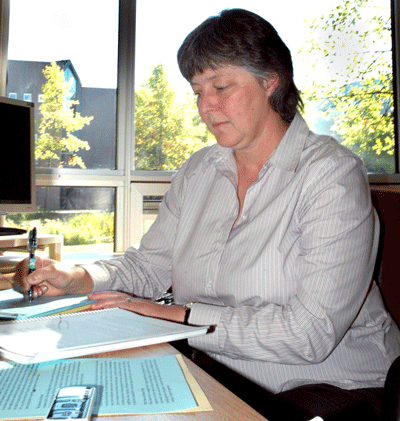Student parents program offers much needed support
October 3, 2010 by Meagan Gill · Leave a Comment
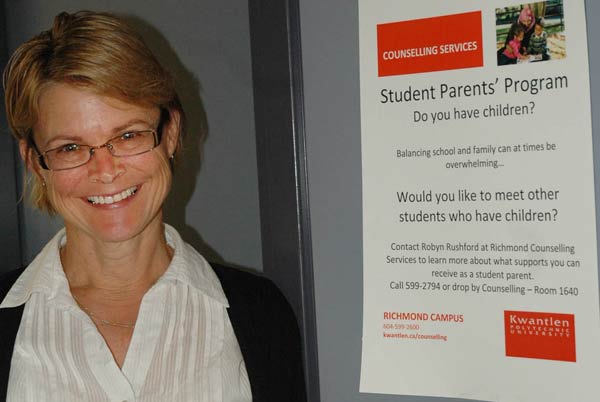
Robyn Rushford, a counsellor at Kwantlens' Richmond campus, stands next to the Student Parents' Program sign on Sept. 27. (Photo by Meagan Gill)
Making the decision to further your education is one of the most important decisions in life. For students who have children, making the decision can be tougher, because they have to try and balance school work with being a parent.
The Student Parents’ Program is a support group that allows students to connect with other students who have children.
The group has weekly sessions that include workshops on parent education, financial planning, taxation, budgeting, study skills, stress management, nutrition and women’s health. They also take part in outdoor activities, arts and crafts, yoga and aerobics classes.
Robyn Rushford, a counsellor at Kwantlen, tries to schedule the group meeting around the students’ class times, to make sure as many students as possible can attend. Currently, she offers support to 15 students, and approximately 6-8 attend the weekly group meetings.
“I hope that this program increases a sense of belonging for the students, because when you do have kids you don’t have as much freedom and flexibility to participate in the school community,” said Rushford.
A former student parent, Rushford understands the challenges students face with finances and balancing class times around daycare.
Student who are parents can receive a $75-a-month per child bursary, with a maximum of $500 per semester. This bursary is offered to the students in fall and spring semesters; the only criteria is that they have to participate in the weekly group meetings.
“It’s a way of supporting the group and supporting the students who make that commitment to the group,” said Rushford.
Through the Kwantlen Foundation, funds are raised for the group which can be used to buy bus tickets from the KSA for students who can’t afford transportation to and from school. For a few years, the students in the program have also been doing fund-raising, usually by having a school bake sale, to support a family in need for Christmas.
“My group really believe in helping those who are in need,” said Rushford.
The Student Parents’ Program has been in existence at the Richmond Campus since 2000. Later this year, the Surrey campus will offer the program as well.
“Some students, in the entire time they are at Kwantlen, will participate in the program,” said Rushford.
One of those students is Jodi Macdonald, a single mother of two, in the last semester of her psychology degree.
“As long as I’ve been at Kwantlen, I’ve been going to the support group,” said Macdonald.
One of the struggles she is facing now is that her son has been ill and she has a hard time making it to classes because her daycare centre won’t take him when he’s sick.
“I’m a single parent and it’s hard to find someone to look after my kids on weekends or in the evenings, but if I do find someone, it’s an issue that my kids are not be seeing me enough during the day. I’m their only parent and it’s not fair to them if I’m never home,” said Macdonald.
Even when she took a break from school to have her baby, Macdonald still attended the group, because she liked the support she received.
“The group gets you out of the house. Usually, when people have a baby, it can get quite isolating if you don’t go out and be with people. It’s nice to talk to other moms because they understand exactly what you’re going through,” said Macdonald.
Kwantlen students dreaming of more sleep
October 3, 2010 by Jocelyn Gollner · Leave a Comment
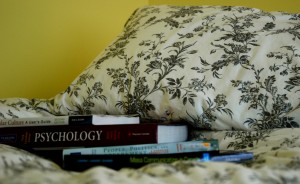
Many students are not getting the recommended 8 hours of sleep per night. (Photo by Jocelyn Gollner)
Kwantlen students may not be getting the sleep that they need.
The average amount of sleep that Kwantlen students get each night is six hours, based on an interview with 15 students. According to Dr. Najib Ayas, a member of the Sleep Disorders Program at UBC, students should be getting about eight.
Without a proper amount of sleep, Ayas says that “ your cognition won’t be as good, so you won’t be as alert. And you won’t be able to learn as well.”
If that doesn’t persuade you to get more sleep, he also says that sleep deprivation “affects your appetite hormones and that can actually lead to weight gain.” But with school, work, relationships, family commitments, sports, etc., getting more sleep can be easier said than done.
“I get like six or seven hours of sleep,” said Jennifer Chong, a student at Kwantlen. “If it were my choice I would get way more. Then I would feel way more relaxed.”
When asked what prevents her from getting more sleep, she said it’s mostly studying.
Jina Seo, a design student, also gets about six hours of sleep each night. Does she feel that that is enough?
“No, of course not,” she said.
RELATED: Stress relief for students is a no-brainer
Stress relief for students is a no-brainer
October 3, 2010 by Amanda Punshon · 1 Comment
Stress — The one thing everyone has and no-one wants…It is known to cause suicide, murder, tumours, AIDS, and cancer. So don’t get stressed out, ’cause stress SUCKS! Usually caused by something unfortunate, like death, job loss, woman loss, school, etc..” (Urban Dictionary).
While there is no scientific correlation between stress and tumours, AIDS or cancer, the author of that definition did get two things right: stress sucks, and it’s something we all have to deal with.
There are many different ways to manage it. Dr. Rod Le Blanc, a doctor of traditional Chinese medicine and acupuncturist, takes a drug-free approach. “Deep breathing and stretching has been the most important way to relieve stress for 4,000 years. Five, maybe. You could even say six.”
In addition to deep breathing and stretching, Dr. Le Blanc says that acupressure or massage can help.
“If you can team up with a friend who wants a massage and you want a massage, you can start working along the back of the spine. And do this gently, because some people are more sensitive than others and some people need more pressure than others, so you always have to be aware of who you’re dealing with…You start up at the top, at the C7 vertebrae and go along the spine.”
If you don’t have a friend who can help you, there are many devices that can do the same thing — even the corner of a doorway can be used to apply pressure along the spine, Dr. Le Blanc says.
Deep breathing and a simple mantra
Like Le Blanc, Jas Maan, a pharmacist at Shoppers Drug Mart on Nordel Way in Surrey, recommends deep breathing to relieve stress. “With breathing exercises, there’s also mantras you can use…I know one really popular one by this Vietnamese Buddhist monk; he put out a few books. One of the ones he said, it was a really simple one was “When I breathe in, I’m happy. When I breathe out, I’m relaxed.” And…[it's] as if someone was reassuring you.”
Maan says that moderate to heavy physical activity — activities such as running and hockey — is a great way to calm down. And as always, exercise and diet go hand-in-hand. “A lot of people find during exam season that they’re really blah…and one of the biggest reasons is that people don’t really pay attention to their nutrition. They’re eating X-Y-Z that’s probably more harmful than good. Things like just getting in their fruits and veggies can go a long way.”
There are also a variety of over-the-counter stress-relief aids.
“There’s Vitamin B-100. It’s a complex of vitamin B. It does help many processes of the body to help reduce stress levels,” Maan says. “There’s another herb as well called valerian root, you can take it at about 100-200mg at bedtime as needed.”
If stress is causing you to lose sleep, Maan recommends taking 25 to 50mg of Benadryl, an allergy medication, which contains the same active ingredient as over-the-counter sleep aids, but is much cheaper. Melatonin, a natural sleep hormone, will also help.
‘We’re never going to be stress-free’
Dawn Schell, a counsellor at Kwantlen’s Surrey campus, knows that “we’re never going to be stress-free. We need stress to hold us together as human beings.” She helps students figure out “the point at which it’s too much, it’s over the top and you can’t cope. We don’t want people to get to the point where they’re not coping at all and everything falls through the cracks.”
Schell advises students to make use of the resources available to them. Kwantlen offers seminars in time management, study skills and avoiding procrastination, all of which Schell identifies as causes of student stress. Students can also come in for individual appointments.
“We’re more than happy to help people sit down and figure out what’s going to work for them, what’s going to work in the immediate short-term, but also to help them look ahead to what are some things that they can learn so they can be more proactive in the future as well. Sometimes people just need to come in and let off some steam; they just need to unload somewhere and they can do that here.”
Schell says the first thing anyone has to do to relieve their stress “is learning about stress — how [I] personally respond to it, what’s stressful for [me]…and how does it affect me physically, and also how does it affect me mentally and how does it affect me emotionally. Because if I am the type of person who, for example, where I carry my stresses all physically, so then the body starts to tense up…then I need to learn how to use physical relaxation techniques.
“For some people it’s the brain that’s going. So how do you stop and calm your brain down enough so then you can refocus on whatever it is you need to do? For some people, it’s a combination. Sometimes they have to start with the mind and then go through the body.”
Building a relaxation toolbox
Once you’ve figured out your stress style, Schell advises assembling a personalized toolbox of relaxation techniques. For some people, that may involve setting deadlines or timelines, self-coaching or taking breaks.
“Sometimes it’s just about the mental break when you’re in school. Just let the brain go on neutral for a short period of time,” she says. There are a variety of online resources that students can use to help with deep relaxation.
If you’re already in the midst of a stressful situation, Schell says to “take five minutes and really sit down and figure out what’s the most important thing I need to do?… Maybe I need to back out of something that I’ve agreed to already. Some of it is, ‘How do I pull back a little bit, in a reasonable way?’ And some of that is really having a serious look at, ‘What is my top priority right now, and how can I do that?’”
Schell also advocates taking breaks.”You need to plan some fun or some relaxation or some time just for yourself in the midst of [stressful situations], because nobody can go through 24 hours-a-day, seven days-a-week without a break. That’s why we have eight-hour work days, that’s why people have lunch breaks…they need to build those kinds of opportunities in as well when they’re students. To just take a break and walk away, but know that there’s a time limit.”
Something as simple as getting up and moving around while studying can change the blood flow and wake you up, she says. And “if you really need a good break, find a movie that you find to be funny, or a show or something, because laughter sure helps a lot.”
Some online stress-relief resources
RELATED: Kwantlen students dreaming of more sleep September 27, 2010 by Meagan Gill · 1 Comment Mohamed El-alem shopping for textbooks at the Kwantlen Polytechnic University bookstore in Richmond on Sept. 24. (Photo by Meagan Gill) It’s no secret that textbooks can be expensive, coming on top of tuition and living expenses. For a student relying on a part-time job to cover these costs, having a social life is pretty much out of the question. “Textbooks are extremely expensive, I just paid $512 on textbooks for this semester,” said Kayla Shimbashi. Fortunately, there are some ways students can save a little extra money. If students buy used textbooks through the bookstore, BC bookworm or Craigslist, it’ll keep more cash in their wallets. “If I had bought my textbooks from the bookstore, it would have cost me about $300. But since I got them used off of Craigslist, I only paid like $170 for them,” said Scott Rachel. Out of 20 Kwantlen students interviewed, only five bought their textbooks used. The majority of the students who bought new textbooks new from the bookstore were first-year students. The students who bought their textbooks used off of Craigslist and BC Bookworm were second- and third-year students. Craigslist is one of the most popular sites for buying and selling used textbooks. You can find textbooks for the majority of your courses being sold up to 50 per cent cheaper and most are in great condition. “I buy my textbooks from the bookstore because it’s just really convenient. When I’m done with them, I usually post them up on Craigslist. I’ve sold four out of eight of my old textbooks on Craigslist,” said Jansen Paulino. BC Bookworm is an organization run by students that allows you to buy and sell used textbooks. It’s free to post an ad and the ad stays up for 90 days. The site states it can help students save up to 35 per cent on their textbooks. “I find BC Bookworm really helpful, I used it to buy a few of my textbooks last semester,” said Fei Hyang. Another way to save some money on textbooks is to borrow from friends or split the cost of textbooks with classmates. “I either buy my textbooks at the bookstore or I borrow them from friends who have taken that course,” said Samantha Sunderland. September 27, 2010 by Sarah Casimong · Leave a Comment In case of emergency, speaker phones are located on the Surrey, Richmond and Langley campuses. The two-way speaker phone is answered by security personnel and faculties. (Photo by Sarah Casimong) Most students, occupied by the stress of classes, barely have time to think about the safety of their environment at the school. It might take a rare incident before students look into what is provided for them by faculties and what they should do if a threat should occur. Of those asked whether they feel safe at Kwantlen, most students said yes. Many acknowledged the presence of security officers as the main reason for their ease. According to the school website, there are security officers on all four campuses. With the exception of Cloverdale, all campuses have emergency speaker phones students can use to call security personnel. Jayson Bulahan, 19, who is studying criminology at the Surrey and Richmond campuses, has been attending Kwantlen for two years and feels free from harm. “I’m aware that there are security guards [around] the campus area,” said Bulahan. “So far, there hasn’t been any issues within campus that has ever made me feel unsafe.” Chiny Babilonia, 21, taking criminology, had similiar views. “I do feel somewhat safe at night,” said Babilonia. “I used to take night classes at the Surrey campus and after class I don’t feel any danger or harm. Whenever I would walk in the parking lot to go to my car, [knowing that there are] security guards walking around campus when it’s near closing time, [helps me feel] safe.” Some students credited the school’s size as a safety factor. “I feel at ease at school, whether it be night or day,” said Michael Viloria, 20, taking history at both Surrey and Richmond. “I think the school is easy-going, although, the threats may come from the outside. Even so, the school isn’t as big as other universities, so finding help in the security office doesn’t require much effort.” However, not all students feel safe. Michelle Mariano, 27, a psychiatric nursing student, is afraid to walk alone at night. “I don’t see any security around,” said Mariano. “Last semester I had a late class. It’s scary if I have to walk by myself.” For more information on security, visit the security section of the school site. September 20, 2010 by Brian Russell · Leave a Comment If psychology piques your interest, or if it’s your current field of study, then the Kwantlen Psychology Society might be the perfect organization to join. Of course, if you do fall into one of those two categories, you probably already know about this. The KPS is a “learning community” that holds discussions and events that benefit psychology students. It was created 10 years ago, but this is the first year the KPS has been associated with the Kwantlen Student Association. “I have been involved with the KPS for five years. In this time, I have seen an increase in membership and an increase in the frequency and variety of events,” said Jocelyn Lymburner, one of the faculty advisors for the group. Lymburner also noted that the KPS is the largest student club on campus. That’s significant for a group that focuses on a specific program, but Lymburner and Jamie Rich, president of the KPS, agree that the continued interest in the club is due in large part to the connection psychology students have to psychology faculty and other students. “[The KPS] puts together monthly pub nights…and movies nights where anyone can join us and be part of discussions,” said Rich. APA seminars are organized to give the opportunity for students to hear from a variety of speakers who are part of the psychology community, many of whom teach at Kwantlen. “Events are often attended by both faculty and students, allowing for increased interaction and relationship building with psychology faculty members,” said Lymburner. Amy Baykey, Social Events Coordinator for the KPS, said “anywhere from 20 to 40 people usually attend the [pub and movie nights]” but that those numbers are seeing some growth. Student led study groups are also put together as a way for psychology students to work together outside of KPS events. Mandy Sheppard, Director of Marketing for the KPS, jokingly insists that the study groups not be called “tutoring sessions.” The next KPS pub night will be held on Sept. 22 at Wings in Surrey; anyone is invited to attend. The KPS is also online with Facebook, which you can find by searching Kwantlen Psychology Society, and on Twitter, under the name KwantlenPsycSoc. September 20, 2010 by Miranda Gathercole · 1 Comment Last week, as they returned to Kwantlen campuses for the fall semester, the KSA was busy welcoming new and returning students to school through a host of events at all four campuses. However, not all of the students were feeling the love. At each campus, the KSA had set up of free food booths, information tables, and activities for students to participate in, including a concert by Karl Wolf at Cram Jam 2010 in Surrey. Some students, such as Jenna Robson, felt that most of the events seemed to be concentrated in Surrey. “I didn’t really notice anything here for Welcome Week,” said Robson, a first-year student at the Langley campus. “It seems like all the real stuff, like Cram Jam, happens in Surrey and it’s hard to get there between classes and work.” Rachelle Tomm, also a first-year student, had a similar opinion about Richmond campus activities. “I didn’t really actually participate. I looked outside and saw people jumping and stuff but I didn’t really know what it was for. I didn’t know it was part of welcome week so I just went on to my classes.” But Tomm still enjoyed the events at Cram Jam. “I went to the Karl Wolf concert in Surrey and loved it. His music is awesome, and plus it wasn’t too too busy so I got to go really close to the stage. I just wish the Richmond campus could have that same fun energy as Surrey did.” Related: Welcome Week in photos. September 19, 2010 by Jeff Groat · Leave a Comment Unlike students at Surrey and Langley campuses, students at Richmond campus already have fast transit access with the Canada Line stopping at Lansdowne station. (Photo by Jeff Groat) The B.C. government has granted smaller universities access to the U-Pass program, but for students at Kwantlen, implementation is easier said than done. The U-Pass is a subsidized bus pass program, allowing holders multi-zone access to Metro Vancouver’s bus and SkyTrain system. For larger universities, like UBC and SFU, who are served well by Translink, Kwantlen’s campuses in the suburbs are faced with challenges that may affect how many people would actually find such a pass useful. “This is a real challenge for, in particular, Surrey, Langley and Cloverdale students,” said Jody Gordon, Associate Vice President, Students at Kwantlen. “[TransLink say[s] there’s no money to put on the table for service improvements, unlike past U-Pass programs,” she said. Gordon cited UBC negotiating for extra B-line service as something that Kwantlen won’t see. This means a traditional U-Pass for Kwantlen that is merely a cheap bus pass doesn’t have the same value as it would at other universities. According to Matt Todd, KSA Director of External Affairs, a typical bus pass needs to be coupled with a variety of other services in order to make it appealing to students who now drive to school, a number that is quite large at Kwantlen. “There isn’t very good transit in some neighbourhoods, in what we call the south-of-Fraser region,” Todd said. “This is a challenge for Kwantlen students, because some of them, public transit is not a reasonable option for them.” A more direct challenge facing Kwantlen is increasing the transit service between campuses by creating an express Kwantlen route between Richmond, Surrey and Langley campuses. Such an option would need to be financed by Kwantlen at the outsest, according to Todd. Based on what it sees as the transit shortfalls, the KSA wants to move beyond the U-Pass into what it’s calling a multipass, marrying the normal transit pass with other services that students may want. “The U-Pass is about healthier living and sustainable living,” Todd said, citing a reason to opt for including such items as a discounted gym membership in the pass. “Of course, not everybody is going to want to be a Gold’s Gym member, so what else can we do?” Todd asked. Another option would be to offer students who drive a discount on parking passes, making sure everyone has something they could take advantage of with a Kwantlen-style U-Pass. Gordon said that identifying which students would qualify for a multipass would not be easy. As some programs do not run on a regular semester-based system, some students who would find a use for the pass could go without one under the current definition. The total cost of a multipass, with all of its extra services, would come in at about $40 according to the KSA, and would likely not be available until fall 2011, although it may be available as early as summer semester next year. • • • Amanda Punshon takes a look back at the history of the popular low-cost transit pass: click on each of the “bus stop” years to see how it has all unfolded. September 18, 2010 by Meagan Gill · Leave a Comment Greg Spoorski uses his BlackBerry to check his Facebook messages while on a break from class on Sept. 16. (Photo by Meagan Gill) Social networking sites such as Facebook and Twitter may seem like a major distraction from doing homework, or anything productive for that matter, but are they really a waste of time? As well as spending time on Facebook poking people, commenting on friends’ new relationships and creeping random profiles, there are some ways Facebook can be used productively. “If you can’t reach someone on the phone, you know they will be on Facebook. It’s helpful because you have a way of getting in contact with them if you missed a class and need their notes,” said Matthew Espinosa. Some Facebook groups can be beneficial to studies. “Everyone is using Facebook now. The people in my class want to start a new group where we can share ideas and keep in touch with each other,” said Brittany Bird. Facebook has a group for Kwantlen Polytechnic University that lets students connect and post events happening on campus. “I find Facebook very helpful with keeping in touch with friends, being able to buy/sell used textbooks and join study groups,” said Joe Che. Facebook also has groups for the different programs offered at Kwantlen Polytechnic University. “The Official Kwantlen Page” is an example of one group that allows past and current students of the fashion program to get together, share ideas, plan events and post pictures of their creations. “I find it very helpful to use social networking, especially Facebook and Twitter, as a marketing medium for my online business,” said Greg Spoorski. Twitter is also a popular choice when it comes to social networking and an effective way to connect with people in 140 characters or less. “I find Twitter incredibly helpful because of the speed it generates information at. I can find out what everyone is doing and things that are happening all around the world, ” said Anna Burchill. February 16, 2010 by Abby Wiseman · Leave a Comment A belly dancer entertains the crowd at the Circus of the Night fundraiser for Big Brothers of Greater Vancouver. (Abby Wiseman photo) Public relations students hosted a big bash for Big Brothers on Feb. 9 at the Circus of the Night fundraiser. Through ticket sales, donations and a silent auction, the second-year students raised $6,900, exceeding their goal of $6,000. The idea behind the event was to create an atmosphere where adults could feel like kids again, said student Alicia Bernbaum. Adding to the circus-vibe was the illusionist Yeeri, two belly dancers and tango dancers and candy apples, popcorn and “circus-tinis” were served. One of the evening’s highlights was a speech by big brother Steve Lee, who spoke about the positive effect being a big brother has on his life. Every year, second year PR students host a charity fundraiser as part of their event management course. Amelia Kennedy is the course instructor and has been a Big Sister for 11 years. She knows how difficult it can be for 24 people to organize an event, and said they did “really well.” “It’s really great to see all their hard work come together, and pull off a really great event, and raise a lot of money for Big Brothers,” said Kennedy.
Students finding ways to save on textbook costs
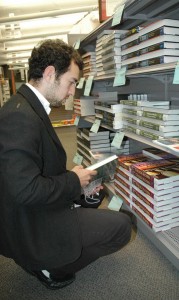
Security officers on campus put students at ease
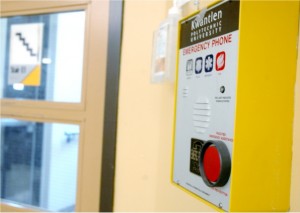
Kwantlen Psychology Society largest student club on campus
Welcome Week not so welcoming?
U-Pass for Kwantlen appears easier said than done

“Langley, Surrey, Delta, those communities don’t have the quality of service that other cities in the Metro Vancouver area have.U-Pass: A timeline
Students finding ways to put social media to work
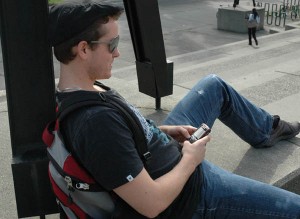
Students raise big money for Big Brothers


